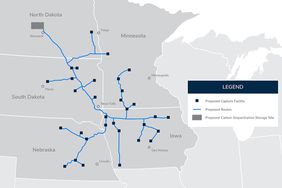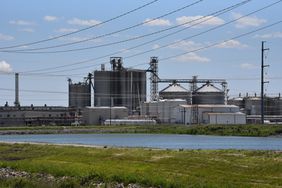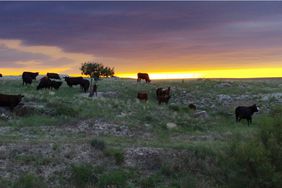:max_bytes(150000):strip_icc()/Axel20Bueckert-1142630212-2-2000-1b83ae5cdb0842ec9028d4299fa2e4cb.jpg)
Nothing is standardized in the emerging era of carbon markets, so the answers to most practical questions about them are, "It depends," and "Read the contract."
Especially, "Read the contract."
Contracts between landowners and companies promising to pay for carbon are getting a little more "meat on the bones" compared to when Todd Janzen, an agriculture attorney in Indianapolis, first reviewed one for a farmer about four years ago. However, these contracts still have many open-ended terms that ag lawyers and others say producers should be aware of to reduce risk and safe-guard future opportunities.
- READ MORE: Data & dollars
New Platforms
Farmers and ranchers participating in carbon markets are currently in the minority. They often are already looking into conservation and regenerative-minded management practices, including no-till and cover crops. However, it is not necessary to be an early adopter as many carbon markets require changes in production practices.
The farmer/rancher generally enters into an agreement with a brokerage company. The brokerage company, or "developer," buys the farmer/ rancher's carbon as a "credit" verified by a third party that measures, assesses, and audits generated credits, in part, by coming to the farm/ranch. Then the brokerage company sells credits through its contracts with companies (such as those in technology, oil and gas, and food processing) wanting to offset their carbon emissions.
:max_bytes(150000):strip_icc()/janzen-2-ca3b44d36ad94e8b8ff06c38f90b1c15.png)
Janzen estimates at least 10 companies are actively recruiting crop farmers to sell carbon credits. The number of options for managers of grazing lands is fewer.
A number of models are used by these brokerage companies. They include, but are not limited to:
- The company pays farmers a flat fee per acre to implement certain practices.
- The company pays a base price determined by the current estimated value of carbon and an estimate of how much carbon the farmer/rancher will store.
- The landowner and the company each share a percentage of the final carbon credit sales price.
Choosing a Partner
:max_bytes(150000):strip_icc()/Howard-2-2000-04abafddd41141c8b2a13ee2e6a2004d.jpg)
It's important to develop a personal relationship with the company with which you partner, says Anson Howard, an agriculture attorney and Texas rancher in a carbon contract.
Howard was already taking multiple soil samples to measure improvements on his rangeland after transitioning from set stocking to adaptive grazing in 2018. When he was approached by a carbon brokerage company in 2021, he was able to negotiate a contract that shifted those costs to the broker.
In an episode of Texas Agricultural Land Trust's Beyond the Fence Line podcast, Howard offered the following questions to help ranchers, in particuLar, evaluate a brokerage company:
- Does the company seem like it truly believes in the concept of soil carbon storage and the value it creates? Is it in the carbon marketplace for the long term?
- How well does it understand the science? Does it have its own team of scientists?
- Are representatives willing to work with you to develop a contract that both parties are comfortable with?
The same principles generally apply to both crop and grazing animal producers as they evaluate carbon brokerage companies and contracts. However, differences may arise because of the nature of the operations/land bases and how long companies have been in the market.
Howard considers an unwillingness to negotiate, within reason, as a red flag against a brokerage company. Janzen, however, says crop farmers should not expect a lot of room for negotiating a contract.
Contract Terms
As a first step when interacting with a brokerage company, Janzen recommends asking for a pro forma statement that outlines expectations for the contracted period of time.
The contract should state how much carbon the farmer is expected to sequester in Year 1, Year 2, Year 3, and so on. It should also outline what payments look like, Janzen says, although it will not likely be clear how much the farmer will make because the markets are somewhat new.
- READ MORE: How to build carbon-rich soil
Janzen has seen contracts for as few as one year to as many as 10. Those who manage primarily grazing lands can expect contracts to last 15 years, according to Howard.
Tiffany Dowell Lashmet, ag law specialist at Texas A&M, presented to a group of ranchers as part of the King Ranch Institute's webinar "Should I Sell Carbon Credits?" available for replay at krirm.tamuk.edu/carbon-credits.
:max_bytes(150000):strip_icc()/lashmet-2-2000-7508dc6509284b509ea315b232a5da66.jpg)
She says some contracts simply state, "the landowner agrees to engage in conservation practices," which should be clarified, as should any land management or development restrictions (such as oil and gas, wind or solar energy generation, and construction).
The legal experts advise watching for several items in a contract:
Stacking prohibitions. A person cannot enroll the same acres in more than one carbon credit program. However, beware of how these prohibitions are written in the contract, Lashmet says. Some contracts are worded so broadly that the landowner may also legally be excluded from participating in other carbon or ecosystem service credit programs (such as governmental programs or programs that would pay for water quality or biodiversity, for example) in the future. The language might also exclude the landowner from participating in programs like EQIP, CRP, ARC, PLC, and others.
Data provision. Most, if not all, contracts will require submission of data, which is why Janzen recommends having good systems for collecting data from management and land use in place before considering carbon markets. For livestock producers, Lashmet has seen contracts require ranchers to submit data as specific as weaning weights, conception rates, and history of fire and pesticide use. Know who will own that data, Howard says, preferably the farmer/rancher.
Penalties. Understand when penalties are triggered and the consequences, Lashmet says. Depending on how the contract is written, penalties could include forfeiting payments or something more severe, like paying for damages or repaying the company for costs incurred if the contract is terminated early.
No-reversal clauses. While not common, be sure you won't be penalized for decreases in the amount of carbon stored in your soil. Don't agree to terms that would require you to pay the carbon broker for not meeting expectations in how much carbon you store, Janzen says.
Future legal limitations. Some contracts may include provisions that limit your ability to take legal action against the company, Lashmet says.
Liability. The broker/verifier should carry insurance and agree to pay damages to the farmer/rancher if injury or damage occurs on the farm/ranch during measurement and verification of carbon sequestration, Lashmet says. She adds the broker should also pay for any increases in property tax due to these activities.
Amendments. Know how and when the contract can be amended and what right you have to renegotiate. In one extreme case, Lashmet saw a contract that would have terminated — and held the landowner responsible — if the landowner objected to an amendment.
Lashmet also points out most contracts allow for drones to fly over the farm/ ranch to inspect and take pictures of it. In addition, most contracts allow the company you agreed to do business with to transfer the contract to another company.
Count the Costs
All three sources recommended having an attorney specializing in ag law review a carbon contract before signing it, which Howard says may cost up to a couple of thousand dollars, depending on location and complexity. Count this, and any other cost associated with the terms of the contract, before moving forward, he says.
Most importantly, he adds, landowners should take a long-term view and not lock themselves into a contract that will limit their participation in future opportunities.
"I think it's a tremendous opportunity for a lot of these ranchers to hop in early on and establish baseline data," Howard says, "but you don't want to be in a position where you're trying to do something with the property that would make the contract trickier and limit your options [down the road]."













